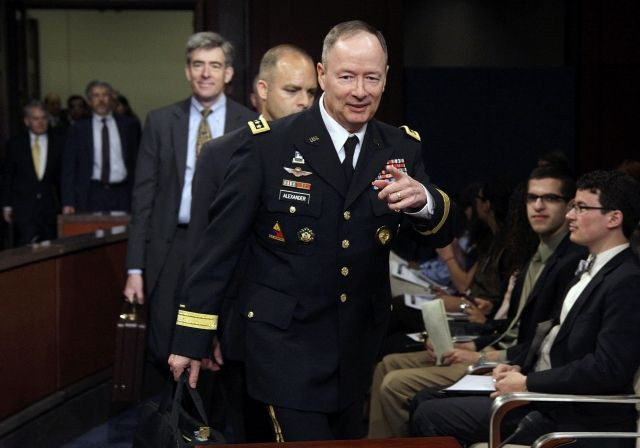
On Tuesday, the head of the National Security Agency, Gen. Keith B. Alexander, said that American surveillance had helped prevent "potential terrorist events over 50 times since 9/11," including at least 10 "homeland-based threats." Although some of the threats that the NSA helped prevent were disclosed at the rare public oversight hearing by the House Intelligence Committee, Alexander said that a vast majority must remain secret to avoid revealing sources and methods.
RELATED: Shia LaBeouf Warned Of NSA Spying 5 Years Ago On 'Tonight' Show [VIDEO]
"These programs are immensely valuable for protecting our nation and securing the security of our allies," General Alexander said. He later proceeded to introduce the deputy director of the Federal Bureau of Investigation, Sean Joyce, who explained some of the attacks the NSA and FBI managed to prevent.
RELATED: Edward Snowden Reveals Himself: 3 Things To Know About The NSA Whistleblower
Joyce said that while monitoring a known extremist in Yemen, intelligence agents "were able to detect a nascent plot to bomb the New York Stock Exchange." The extremist was in contact with an individual in Kansas City, who was later arrested. Asked if their intention to bomb the Stock Exchange was "serious," Joyce said, "The jury considered it serious since [the suspects] were all convicted."
RELATED: Edward Snowden Comes Forward Via The Guardian For NSA Leaks
Joyce also discussed how the government used its email-monitoring program to thwart a plot to bomb the New York City subway system, which had been previously reported. In that case, the NSA intercepted an email from a terrorist in Pakistan to someone living in the United States that discussed a recipe for explosives. That person turned out to be Najibullah Zazi, who later pleaded guilty to the plot in federal court.
In a third case, Joyce talked about a San Diego man who planned to send financial support to a terrorist group in Somalia, and who was identified because the NSA flagged his phone number as suspicious through its database of all domestic phone call logs.
RELATED: Immigration Reform 2013: Mike Lee Says NSA Spying Debacle Should Worry Reform Supporters [VIDEO]
"As Americans, we value our privacy and our civil liberties," General Alexander said. "As Americans, we also value our security and our safety. In the 12 years since the attacks on Sept. 11, we have lived in relative safety and security as a nation. That security is a direct result of the intelligence community's quiet efforts to better connect the dots and learn from the mistakes that permitted those attacks to occur in 9/11."
© 2025 Latin Times. All rights reserved. Do not reproduce without permission.





